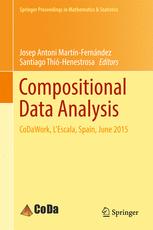

Most ebook files are in PDF format, so you can easily read them using various software such as Foxit Reader or directly on the Google Chrome browser.
Some ebook files are released by publishers in other formats such as .awz, .mobi, .epub, .fb2, etc. You may need to install specific software to read these formats on mobile/PC, such as Calibre.
Please read the tutorial at this link: https://ebookbell.com/faq
We offer FREE conversion to the popular formats you request; however, this may take some time. Therefore, right after payment, please email us, and we will try to provide the service as quickly as possible.
For some exceptional file formats or broken links (if any), please refrain from opening any disputes. Instead, email us first, and we will try to assist within a maximum of 6 hours.
EbookBell Team

5.0
110 reviewsThe authoritative contributions gathered in this volume reflect the state of the art in compositional data analysis (CoDa). The respective chapters cover all aspects of CoDa, ranging from mathematical theory, statistical methods and techniques to its broad range of applications in geochemistry, the life sciences and other disciplines. The selected and peer-reviewed papers were originally presented at the 6th International Workshop on Compositional Data Analysis, CoDaWork 2015, held in L’Escala (Girona), Spain.
Compositional data is defined as vectors of positive components and constant sum, and, more generally, all those vectors representing parts of a whole which only carry relative information. Examples of compositional data can be found in many different fields such as geology, chemistry, economics, medicine, ecology and sociology. As most of the classical statistical techniques are incoherent on compositions, in the 1980s John Aitchison proposed the log-ratio approach to CoDa. This became the foundation of modern CoDa, which is now based on a specific geometric structure for the simplex, an appropriate representation of the sample space of compositional data.
The International Workshops on Compositional Data Analysis offer a vital discussion forum for researchers and practitioners concerned with the statistical treatment and modelling of compositional data or other constrained data sets and the interpretation of models and their applications. The goal of the workshops is to summarize and share recent developments, and to identify important lines of future research.